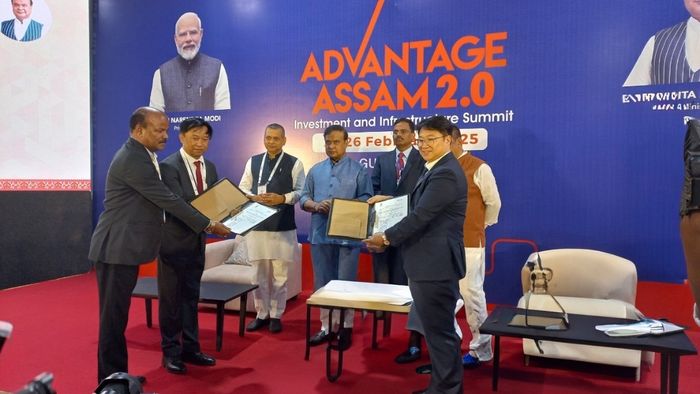Korean clean fuel company Bio Friends to set up $30 million DME plant in Assam's Namrup
Bio Friends is setting up a $30 million DME plant in Assam to promote clean energy and create jobs.

- May 15, 2025,
- Updated May 15, 2025, 2:59 PM IST
South Korea’s clean energy company Bio Friends Inc. is setting up a dimethyl ether (DME) production plant in Namrup, Assam, marking a key step in India’s push for alternative fuels. The project, in partnership with Assam Petro-Chemicals Ltd. (APL), was formalised through a Memorandum of Understanding (MoU) during the Advantage Assam 2.0 summit held in Guwahati on February 25–26, 2025.
The facility will have an annual capacity of 40,000 tons in its first phase, with an estimated capital investment of $30 million (approximately Rs 250 crore or 43 billion Korean won). This initiative is part of a broader strategy to promote clean fuels and reduce carbon emissions, aligning with India's growing emphasis on eco-friendly energy policies.
Established in November 2016, Bio Friends specialises in producing and supplying dimethyl ether, a renewable and cleaner alternative fuel. The company purifies DME using proprietary technology and distributes it globally. Its operations span multiple sectors, including compound chemicals, hydrogen energy, power generation, and fuel. Bio Friends is active in several countries, including Indonesia, Malaysia, Japan, China, Austria, the USA, and Norway.
As part of the Indo-Korean collaboration, Bio Friends has received approval from the Government of the Republic of Korea to study the Indian DME market for three months. The study includes economic feasibility analysis, plant design, and assessment of production capacity. Following approval from APL’s board, full-scale implementation of the Namrup project will begin.
The investment will be supported by Indian institutional investors, DME promotion companies, and South Korean backers. The goal is to make Assam a focal point of India’s clean fuel movement using LPG+DME blended fuel for both domestic and industrial purposes.
Dimethyl ether (DME) is a synthetic, colourless gas that serves as an alternative to diesel and LPG. It can be produced from a variety of sources, including coal, natural gas, and biomass. Its compatibility with existing LPG infrastructure has made it a promising candidate for India’s green fuel mix.
At Advantage Assam 2.0, Prime Minister Narendra Modi emphasised the importance of Assam in India’s clean energy roadmap, stating that the state would play a vital role in meeting the country’s carbon neutrality targets through renewable initiatives like the DME project.
Bio Friends CEO Wonjun Cho, speaking at the event, confirmed the company’s intent to enter the Indian market through Assam. “In order to make a full-fledged entry into the Indian fuel market, we plan to propose a policy ordinance for the supply of LPG+DME blended fuel in the state of Assam,” said Cho.
“Our first phase will include a 40,000-ton plant, and we plan to expand this to 80,000 tons in the second phase. This expansion will allow us to aggressively promote carbon-neutral fuel supply in India.”
Cho added that beyond clean fuel, the project will contribute to both economic and social development in Assam. A team from Bio Friends is scheduled to visit India at the end of May to further advance the project’s development.
From the Indian side, Assam Petro-Chemicals Ltd. Managing Director Rajnesh Gogoi outlined the wide-ranging benefits of the DME project. He emphasised that technology transfer from Bio Friends will give APL access to cutting-edge innovations, including bio-based chemical processes and sustainable petrochemical production.
Gogoi noted that the plant will drive economic growth through job creation in areas such as operations, logistics, and management. “This collaboration will also bring specialised skills and technical training to the local workforce, enhancing long-term capacity,” he said.
He added that revenue generated from DME production and sales will support reinvestment in local infrastructure and public services. The initiative is expected to reduce Assam’s dependence on traditional fossil fuels like coal and LPG, improving both environmental quality and public health.
Further benefits include energy security, promotion of renewable feedstocks like biomass, and the emergence of Assam as a centre for industrial and chemical development. With DME used in sectors such as transport, refrigeration, and aerosol manufacturing, Assam could become a key player in multiple industries.
Infrastructure development around the plant will also trigger upgrades in transportation, storage, and supply chains. Community development is another focal point, with better energy access and public service improvements expected to raise local living standards.
Corporate social responsibility (CSR) activities by Bio Friends and APL may include support for schools, healthcare, and renewable initiatives. The collaboration could also elevate Assam’s profile nationally and internationally as a pioneer in green energy, attracting further investments and partnerships.